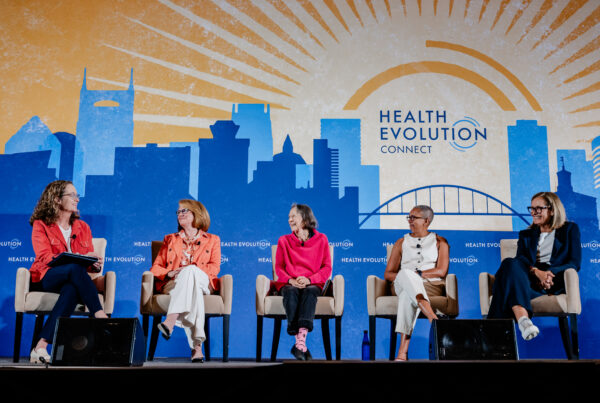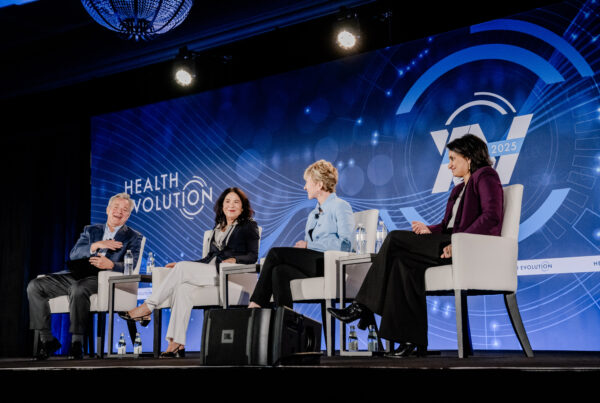Nearly a year ago, Ginger CEO Russell Glass and Headspace co-founder Richard Pierson struck up a conversation that ultimately resulted in the companies signing a definitive agreement to merge this week.
Health Evolution Editor-in-Chief Tom Sullivan spoke with Glass about why the organizations combined, his role as CEO of Headspace Health, and what’s next for the new enterprise.
Health Evolution: How did the discussions that led to this merger start?
Glass: We were first introduced by Jeff Weiner. I sold my last company to LinkedIn and Jeff has been a mentor as well as a supporter of Headspace. Jeff and I were talking about how I saw the increasing awareness and consciousness in mental health, in addition to the need, and he said, “You should really talk to Headspace because they are saying the same things to me.” When I spoke with co-founder Rich Pierson it was a bit of a mind meld as if we were singing from the same hymnal. We really got on well. And there was a feeling of both business logic and culture fit that made a ton of sense about what we are both trying to accomplish in the world. There’s a great fit in the complementary nature of what we do. Headspace has preventative services and experiences and we have the capabilities from coaching all the way through to psychiatric services. Headspace is also very sciences-based with more than 25 studies published in peer review journals and we take a similar approach.
Health Evolution: So the conversations started obviously amid the pandemic, so why combine now?
Glass: We’ve been looking at what was happening over the last 18 months, the massive increase in demand and we recognized that there is going to be far more investment coming into the mental health space. All that makes now the time to do something to dramatically accelerate.
Health Evolution: Based on that acceleration strategy, what does the combined enterprise enable Headspace Health to do that would not be possible as separate entities?
Glass: We think we can build the world most accessible and comprehensive digital health and wellbeing platform. Mental health needs to be democratized. We need a way for people to access affordable, comprehensive, preventative care so they can take care of themselves before they get really sick by building routines throughout their lives to maintain resilience because we are all going to go through something. So we’re bringing together the people in need of more acuity, maybe they need a coach to support them, and medication management. We can manage that full spectrum, and being able to do that felt, to us, like a huge gap in the world and one that Headspace Health can fill. We’ll be approaching 100 million lives across more than 190 countries with over 2,700 employers and health plans as enterprise clients, and a $300 million in bookings by the end of this calendar year.
Health Evolution: You will serve as CEO of Headspace Health. Both Ginger and Headspace will continue to operate as individual brands and this deal is being described as a merger of equals so how will the combined companies be structured?
Glass: No money is being exchanged. We’re combining in a 50-50 governance arrangement. We will be spitting the leadership function. CeCe Morken will be the CEO of Headspace and become President of Headspace Health. Headspace will continue to focus on everything it focuses on today. Over time, Headspace will power more capabilities and Ginger will continue to operate low-cost high-quality services to employers and members so the merger enables us to offer a spectrum of health services.
Health Evolution: How was it decided that you would become CEO of Headspace Health?
Glass: The most recent group to invest in Ginger was saying, “We bet on you Russ. If we’re going to make this happen, you need to stay in the CEO seat.” To get this done quickly it made sense for me to be CEO but I look at it as a partnership as much as anything else.
Health Evolution: And what about the other Headspace co-founders including Pierson and Andy Puddicombe?
Glass: The final composition of the joint board of directors is still under review. We expect to that finalized by the close of the merger. The deal is pending regulatory review. That should be completed by the end of September, so we expect to close the deal by the end of September.
Health Evolution: Once the merger formally closes, what’s next? What’s the grand vision for Headspace Health beyond bringing the two entities together?
Glass: We plan to continue to innovate and grow. We are already supporting Cigna, Kaiser Permanente and Oscar populations. We launched a Medicaid plan aligned with this vision of democratization, AmeriHealth Caritas. If you look at the need in the world today, the WHO estimates that there are more than 1 billion people with an active behavioral need that is undiagnosed. We know that 50 percent of the world’s population will have a mental health need in their lifetime. That’s billions of people who could derive value from this platform. Ten percent of enterprises have a dedicated behavioral health solution. That should be 100 percent so there’s massive room for growth. We built the technology to do this at scale.









